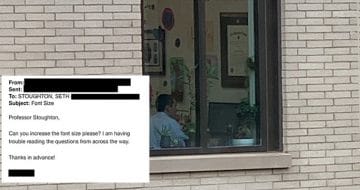Told of error halfway through open-book assessment

Some final year law students at the University of Oxford were left angry and confused after reportedly receiving the wrong criminal law exam last week.
An error by the elite law school meant the wrong criminal paper was uploaded to Weblearn, Oxford Uni’s online portal for open-book exams.
However, it wasn’t until halfway through the open-book exam that students were notified of the epic blunder. As first reported by The Oxford Student, students were told by email to begin the online exam again with the correct paper. The law faculty has since said to have advised students affected to submit a self-assessment mitigating circumstances form.
Oxford Uni’s apparent oversight has been criticised by students, with many wondering whether they should be regularly checking their emails during exams.
Speaking to the student newspaper, one candidate who sat the exam complained:
“Not only that the faculty could be so monumentally stupid as to have given us the wrong paper in the first place, but also to send us an incoherent email about it halfway through the exam, and fail to apologise for the mistake.”
The exam gaffe follows a mistake made earlier in the same week, which saw finalists told to answer the wrong number of questions in a land law exam.
Final year law students are said to have received official instructions a week before the open-book exam, telling them to answer four questions including at least one problem question. However, when they actually sat the land law exam, the paper explicitly asked candidates to instead answer two problem questions.
According to Cherwell, the law faculty was aware of the issue but failed to inform all finalists.
The conflicting instructions saw many students left unsure about how to approach the exam, with one commenting:
“It’s disappointing but not unprecedented that an exam should contain a typo. What is shocking is that the fact of the mistake wasn’t immediately communicated to everyone taking the exam and clear instructions given about whether to follow the conventions or the exam. That is what would have been done in an in-person, invigilated exam.”
They went on to argue that candidates were also put in an unfair position:
“It is even more surprising that only some candidates were told that there would be no penalty for breaching the exam rubric. Forcing students to work out, in the middle of an exam, whether they should ‘break’ the rules to perform best, while only some are told that there will be no consequences for doing so, ironically raises some interesting jurisprudential questions about obedience to law. I would have preferred to deal with those in the jurisprudence paper, rather than in the land paper.”
Responding to the exam blunders, a spokesperson for the University of Oxford said:
“We will not comment on individual papers while the exam process is ongoing. However, the University has always had process in place so errors can be flagged in the conduct of exams. This process has been adjusted for this year’s open-book exams and communicated to all students sitting these exams. Exam boards will take any errors into consideration when finalising marks.”


